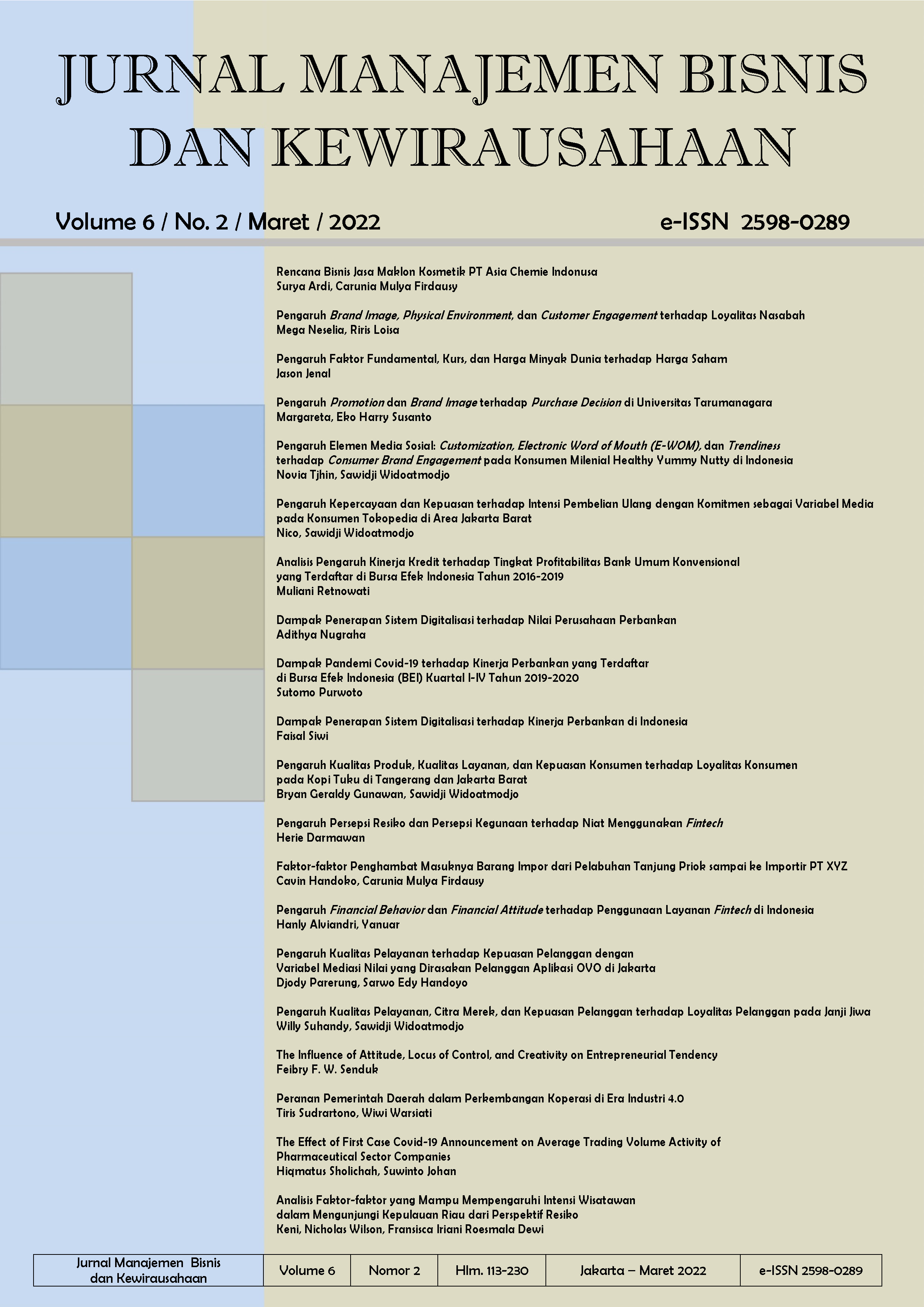The Influence of Attitude, Locus of Control, and Creativity on Entrepreneurial Tendency
Main Article Content
Abstract
Article Details
This work is licensed under a Jurnal Manajemen Bisnis dan Kewirausahaan Creative Commons Attribution-ShareAlike 4.0 International License.
References
Ajzen, I. (1991). The theory of planned behavior. Organizational Behavior and Human Decision Processes, 50(2), 179–211. https://doi.org/10.1016/0749-5978(91)90020-T
Alma, B. (2007). Belajar mudah penelitian. Alfabeta.
Azwar, S. (2010). Sikap manusia teori dan pengukurannya (2nd ed.). Pustaka Pelajar.
Drucker, P. F. (1994). Innovation and entrepreneurship. Erlangga.
Hatten, T. S., & Ruhland, S. K. (1995). Student attitude toward entrepreneurship as affected by participation in an SBI program. Journal of Education for Business, 70(4), 224–227. https://doi.org/10.1080/08832323.1995.10117754
Hirsch, T., Spielmann, M., Zuhaili, B., Koehler, T., Fossum, M., Steinau, H. U., Yao, F., Steinstraesser, L., Onderdonk, A. B., & Eriksson, E. (2008). Enhanced susceptibility to infections in a diabetic wound healing model. BMC Surgery, 8(5), 1–8. https://doi.org/10.1186/1471-2482-8-5
Kaufmann, P. J., Welsh, D. H. B., & Bushmarin, N. V. (1995). Locus of control and entrepreneurship in the Russian Republic. Entrepreneurship Theory and Practice, 20(1), 43–56. https://doi.org/10.1177/104225879502000103
Oentoe. (1999). Kreativitas guru dalam mengantisipasi perubahan-perubahan dalam pendidikan (Studi kasus di SMU Katolik St. Albertus Malang). Universitas Negeri Malang.
Othman, N. H., & Ishak, S. B. (2009). Attitude towards choosing a career in entrepreneurship amongst graduates. European Journal of Social Sciences, 10(3), 419–434.
Palaniappan, A. K., & Rafik-Galea, S. (2009). Creativity and entrepreneurial tendencies among from two Malaysian students. Journal of Applied Sciences, 9(19), 3539–3546. https://doi.org/10.3923/jas.2009.3539.3546
Prodjosoesilo, S., & AP, S. S. (2012). Analisis hubungan kausal motivasi, sikap dan proses belajar mengajar terhadap minat berwirausaha para mahasiswa pada Universitas Negeri di kota Malang. Vidya, 20(3), 1–18. https://vidya.wisnuwardhana.ac.id/index.php/vidya/article/view/4/5
Reiss, M. C., & Mitra, K. (1998). The effects of individual difference factors on the acceptability of ethical and unethical workplace behaviors. Journal of Business Ethics, 17(14), 1581–1593. https://doi.org/10.1023/A:1005742408725
Renn, R. W., & Vandenberg, R. J. (1991). Differences in employee Attitudes and Behaviors Based on Rotter’s (1966) Internal-External Locus of Control: Are They All Valid? Human Relations, 44(11), 1161–1178. https://doi.org/10.1177/001872679104401102
Risnoyatiningsih, S. (1994). Hubungan kreativitas dengan produktivitas kerja dosen Fakultas Teknik UPN “Veteran” Surabaya. Universitas Negeri Malang.
Robinson, P. B., Stimpson, D. V., Huefner, J. C., & Hunt, H. K. (1991). An attitude approach to the prediction of entrepreneurship. Entrepreneurship Theory and Practice, 15(4), 13–32. https://doi.org/10.1177/104225879101500405
Rotter, J. B. (1966). Generalized expectancies for internal versus external control of reinforcement. Psychological Monographs: General and Applied, 80(1), 1–28. https://doi.org/10.1037/h0092976
Sarri, K. K., Bakouros, I. L., & Petridou, E. (2010). Entrepreneur training for creativity and innovation. Journal of European Industrial Training, 34(3), 270–288. https://doi.org/10.1108/03090591011031755
Sternberg, R. J. (Ed.). (1999). Handbook of creativity. Cambridge University Press.
Suryana. (2001). Kewirausahaan. Salemba Empat.
Tsui, J. S. L., & Gul, F. A. (1996). Auditors’ behaviour in an audit conflict situation: A research note on the role of locus of control and ethical reasoning. Accounting, Organizations and Society, 21(1), 41–51. https://doi.org/10.1016/0361-3682(95)00009-X
Widarjono, A. (2010). Analisis multivariat terapan (1st ed.). UPP STIM YKPN.
Williams, S. D. (2004). Personality, attitude, and leader influences on divergent thinking and creativity in organizations. European Journal of Innovation Management, 7(3), 187–204. https://doi.org/10.1108/14601060410549883
Winarno. (2011). Pengembangan sikap entrepreneurship dan intrapreneurship. Indeks.
Zoraifi, R. (2005). Pengaruh locus of control, tingkat pendidikan, pengalaman kerja, dan pertimbangan etis terhadap perilaku auditor dalam situasi konflik audit. Jurnal Akuntansi Dan Bisnis, 5(1), 12–26. https://doi.org/10.20961/jab.v5i1.17


